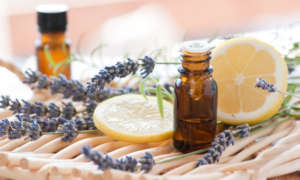The ingredients of a good night’s sleep include sticking to a regular sleep schedule, choosing a comfortable mattress and pillow, engaging in regular exercise and avoiding frequent naps during the day.
The right environment is also important. Generally, the sleep environment should be cool – between 60 and 67 degrees, according to the National Sleep Foundation – dark and free from distracting noises. The room should also be free of allergens, such as dust mites or airborne pollutants.
A handful of recent studies also suggest that the scent of lavender may improve sleep quality for some people.
Lavender oil and slow wave sleep
One 2015 study reported in Nursing in Critical Care examined the effects of lavender oil aromatherapy on critical-care patients who typically cannot sleep well. The study focused on 60 intensive care unit (ICU) patients with coronary artery disease, and found that patients who were administered aromatherapy of lavender essential oil for 15 consecutive days slept better and experienced reduced levels of anxiety. The study recommended lavender oil aromatherapy as a non-invasive clinical practice for other cardiac patients in ICUs.
Other studies have shown that exposure to lavender essential oil just before bedtime increases the percentage of sleep time spent in slow wave sleep (SWS), a sleep stage considered essential to deep, nourishing sleep. In comparison to rapid-eye-movement (REM) sleep – which is when dreams occur – SWS sleep is a recuperative stage during which the body release hormones and proteins that heal tissue and boost the immune system.
 Not all lavender oils are equal
Not all lavender oils are equal
It’s important to understand the difference between lavender essential oils and lavender fragrance oils. While the studies mentioned above tested the efficacy of lavender essential oil, many lavender fragrances are “fragrance” oils, not “essential” oils.
- Essential oils: These are naturally occurring substances extracted from the plant itself.
- Fragrance oils: These are manufactured scents made with artificial ingredients to simulate the scent of natural oil, such as lavender essential oil.
While lavender essential oil has been shown to have a beneficial effect on sleep quality, lavender fragrance oil may present a very different picture. That’s because when fragrance oils are heated up and released into the air, they release the volatile organic compounds (VOCs) of which they are made up. These can include formaldehyde, ethanol, benzene and other toxic substances. A fragrance oil that is meant to smell like essential lavender oil may smell similar to the natural product, but it may be putting your health at risk.
 How to use lavender oil at home
How to use lavender oil at home
Scientific studies on the effects of lavender oil are typically conducted under carefully controlled circumstances. For example, in one study of the effects of lavender oil on anxiety, patients inhaled two drops of two percent lavender essential oil – through a patch inside an oxygen mask – for a period of 20 minutes a day.
Obviously, these controlled conditions would be impractical at home. However, there are steps you can take to ensure that the lavender oil you use is free of added chemicals and is properly and safely administered. Here are a few guidelines:
- Choose lavender essential oil, not fragrance oil. As noted previously, lavender essential oil is a natural compound extracted from the actual lavender plant. Avoid manufactured fragrances that mimic the scent of lavender but fill the air with toxic VOCs.
- Use a vaporizer or low-heat diffuser to disperse lavender essential oil. Or use a no heat fan diffuser. A few drops may be all you need. Avoid high-heat diffusers that can alter the chemical makeup of the lavender oil.
- Avoid burning candles that add lavender fragrance to your home. Some aromatherapy candles have metal-core wicks that contain lead. Slow-burning candles may also emit VOCs and soot particles.
By taking these few simple precautions to ensure you are using lavender oil correctly and safely, you may sleep better and feel better as a result of the effects of this natural substance. And, you will enjoy the many benefits of lavender without compromising the air quality in your home.
Post Disclaimer
This content is for informational purposes only and does not constitute medical advice. Please consult a healthcare professional for any medical concerns.



